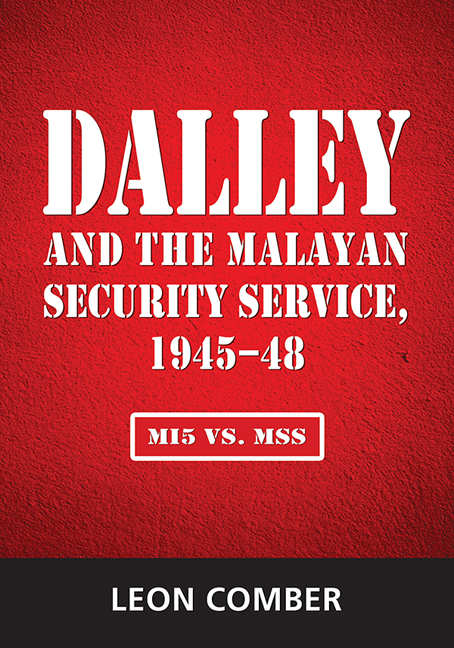Book contents
- Frontmatter
- Contents
- Preface
- Acknowledgements
- List of Abbreviations
- 1 Lieutenant Colonel John Dalley and the MSS: Early Days
- 2 Lieutenant Colonel John Dalley and Dalforce
- 3 The Establishment of “Security Intelligence Far East (SIFE)” in Singapore
- 4 Dalley's Return to Singapore
- 5 The Indonesian Situation and Malaya
- 6 Indonesian Encroachment into Malaya
- 7 Arrangements for Allocation of MSS Staff to Special Branch, Singapore, and Special Branch, Malaya
- 8 Conclusion
- Appendices
- Bibliography
- Index
- About the Author
5 - The Indonesian Situation and Malaya
Published online by Cambridge University Press: 12 February 2019
- Frontmatter
- Contents
- Preface
- Acknowledgements
- List of Abbreviations
- 1 Lieutenant Colonel John Dalley and the MSS: Early Days
- 2 Lieutenant Colonel John Dalley and Dalforce
- 3 The Establishment of “Security Intelligence Far East (SIFE)” in Singapore
- 4 Dalley's Return to Singapore
- 5 The Indonesian Situation and Malaya
- 6 Indonesian Encroachment into Malaya
- 7 Arrangements for Allocation of MSS Staff to Special Branch, Singapore, and Special Branch, Malaya
- 8 Conclusion
- Appendices
- Bibliography
- Index
- About the Author
Summary
When Dalley was confident that the serious threat posed by the MCP to overthrow British rule in Malaya, which he had long persisted in reporting, had at last been officially recognized and was being dealt with by the government, he turned his attention to another security problem that was beginning to emerge in the Malayan Peninsula. Indonesian left-wing elements were making determined efforts to induce Malay nationalist and left-wing political parties — many of them having maintained contact over time either directly or through the considerable number of Indonesians who had settled in Malaya — to rise up against British rule and resist the return of the British to Malaya, as the Indonesians had done to the Dutch in Indonesia.
In fact, as Dalley well appreciated, if they had succeeded, it was quite possible the Malay nationalist and left-wing parties would join forces with the MCP to present a united Malay-Chinese front to fight against British colonial rule in Malaya, which would have placed the British in a much more difficult situation than they faced in fighting the MCP alone when the Malayan Emergency was declared in June 1948.
The Japanese had virtually “given” independence to Indonesia in the confused period shortly before they surrendered, when Sukarno and Hatta declared independence on 17 August 1945, leading to the establishment of the Indonesian Republic under Sukarno as President. As rumours of the Japanese surrender filtered through to the people of Singapore/Malaya, Malay nationalists also intended to declare independence at the same time, and it is said that the Malay nationalist leader Mustapha Hussain wept bitterly as the Japanese surrender forestalled the declaration of independence for Malaya by just forty-eight hours, thus destroying the dream of a greater Malay nation.
However, in Indonesia the political situation was soon overshadowed by the fighting that took place between the Indonesian Republican forces, who were impatient and determined to wrest independence for Indonesia from the returning Dutch colonial power by force rather than negotiation. Matters were further complicated by the arrival of a brigade of the 23rd British Indian Infantry Division, sent by the British from Singapore to assist in the evacuation of Dutch civilians who had been interned by the Japanese during the war.
- Type
- Chapter
- Information
- Dalley and the Malayan Security Service, 1945–48 , pp. 56 - 87Publisher: ISEAS–Yusof Ishak InstitutePrint publication year: 2018

